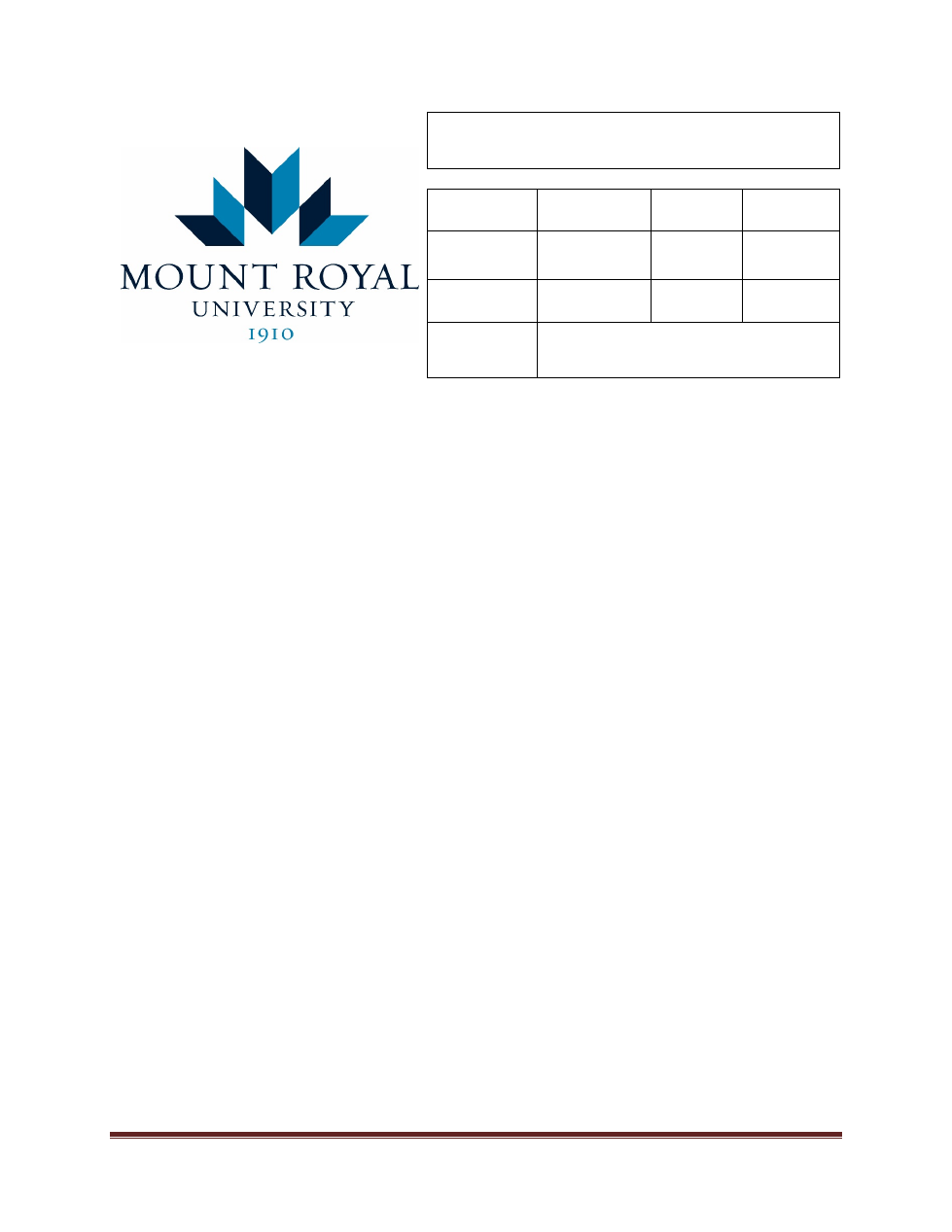
Government Relations Policy – April 16, 2012
Page 1 of 4
GOVERNMENT RELATIONS POLICY
Policy Type:
Management
Initially
Approved:
April 16, 2012
Policy
Sponsor:
Vice-President,
University
Advancement
Last
Revised:
April 16, 2012
Primary
Contact:
University
Advancement
Review
Scheduled:
April 2025
Approver:
Board of Governors
A.
OVERVIEW
Mount Royal University is a publicly funded institution as well as a registered not-for-profit
charitable organization. As such, the University falls within the scope of the Election Finances
and Contributions Disclosure Act as a “prohibited corporation” and the Charities Act as a “charity.”
This Policy acknowledges the University’s obligation to abide by the provisions of these Acts and
takes into consideration the associated level of public accountability related to all expenditure
activities of the institution.
B.
PURPOSE
The purposes of the Government Relations Policy include:
(1)
to ensure proper protocol is followed with respect to communication with government
officials;
(2)
to provide guidelines for the appropriate use of University funds to ensure compliance with
relevant federal and provincial legislation;
(3)
to promote responsible stewardship of public funds.
C.
SCOPE
This Policy applies to all University employees and all funds administered by the University.
D.
POLICY STATEMENT
1.
COMMUNICATIONS WITH GOVERNMENT
The Minister of Advanced Education (Minister) is ultimately accountable to the Legislature
for the operation and performance of the post-secondary system, and in particular, that
public post-secondary institutions are fulfilling their mandates. The Minister manages
his/her/their accountability at arm’s length through a relationship with the governing board
of each institution.
1.1
The Board of Governors’ (Board’s) relationship with the President and with the
Provincial Government (which occurs primarily through the Minister) is key. This
intermediary role helps the Board provide direction to the University in a way that

Government Relations Policy – April 16, 2012
Page 2 of 4
addresses both the unique needs of Mount Royal University and the public. This
role also enables the Board, primarily through the Board Chair, to provide input to
the development of provincial policies by providing advice on issues and trends,
reacting to proposals and statements put forward by the Minister and the
Department of Advanced Education (Department), Board recommending policy
changes to the Minister, and keeping the Minister informed about the development
of Mount Royal and its plans for the future.
1.2
The Board Chair serves as the voice of the Board to the Minister and the public.
Operational issues are delegated to the CEOs of the Department (Deputy Minister)
and the Institution (President), who work together or, in many cases, further
delegate tasks to other officials.
1.3
As the chief executive officer of the Board of Governors, the President is the only
University employee authorized to serve as the University’s official spokesperson
and as its responsible authority for communicating with government officials. In
practice, in this area as in others, the President delegates portions of his/her/their
responsibility to other senior officials of the University. This Policy is designed to
provide clear guidelines in respect to the President’s delegation of authority to
other University officers.
a. All written or communications making commitments by the University or
seeking approvals from external sources for funds, academic programs,
academic services or activities, inter-institutional cooperation, and evaluations
of programs or operations shall be signed by the President.
b. Communications with the Premier and Minister shall normally be conducted by
the Board Chair or with the Board Chair’s approval. Communications with the
Deputy Minister and Assistant Deputy Ministers shall be conducted by the
President or with the President’s approval.
c. The Vice Presidents may carry on discussions and preparatory or informational
correspondence with government personnel with respect to matters relevant to
their Divisions, subject to the condition that the President receives copies of all
correspondence and timely reports on important discussions. Unless
authorized by the President, the Vice Presidents may commit only to
recommend a University commitment to the President.
d. The Vice Presidents will normally conduct correspondence with government
officials below the level of Assistant Deputy Minister.
e. With the prior approval of the appropriate Vice President, Associate Vice
Presidents, Deans and Directors may carry on discussions and preparatory or
informational correspondence with government personnel with respect to
matters relevant to their areas of responsibility, subject to the condition that the
Vice President receives copies of all correspondence and timely reports of
important discussions. The Associate Vice President, Dean or Director may
commit only to make a recommendation to the Vice President. Typically, the
Associate Vice President, Dean or Director meets with government officials in
the presence of the Vice President.
f. With the prior approval of the Vice President, the Dean may authorize a
Department Chair or Program Director (Faculty of Continuing Education &
Extension) to begin discussions with peers in government departments.
Copies of any correspondence and reports of meetings are to be provided to
the Dean.

Government Relations Policy – April 16, 2012
Page 3 of 4
g. Typically, the Dean will be present at any discussions after the initial
exploratory meeting and will assume the responsibility for further
correspondence. The Department Chair or Program Director meets with
government officials at the invitation of the Dean, Vice President or President.
2.
POLITICAL CONTRIBUTIONS
Mount Royal University funds or property are not to be given as a contribution to any
political party or to any candidate, or holder of public office, in conformity with relevant
legislation. This prohibition extends to all indirect contributions such as the price of
admission tickets to sporting, social or other events where part of the proceeds are directed
to a political party or candidate.
3.
POLITICAL FUNDRAISING DINNERS AND EVENTS
In the case of federal or provincial political fundraising dinners or events, the University
follows the regulations provided by the provincial government. University officials or
representatives are free to attend political fundraising dinners or events as a guest. All
University employees are free to attend such events at their own expense. In the event a
University official or representative finds it necessary to purchase a ticket for business
conducted on behalf of the University, the expense will be reimbursed in accordance with the
limits stipulated in the Alberta Election Finances and Contributions Disclosure Act:
Fund-raising functions
23(1) In this section, “fund-raising function” includes any social function held for the purpose
of raising funds for the registered party, registered constituency association or registered
candidate by whom or on whose behalf the function is held.
(2) The gross income from any fund-raising function must be recorded by the chief financial
officer of the registered party, registered constituency association or registered candidate
that held the function or on whose behalf the function was held.
(3) If an individual charge by the sale of tickets or otherwise is made for a fund-raising function
held by or on behalf of a registered party, registered constituency association or registered
candidate, then for the purposes of this Act,
(a) if an individual charge is $50 or less, it shall not be considered as a contribution unless
the person who pays the charge specifically requests that it be so considered, in which
case 1/2 shall be allowed for expenses and 1/2 shall be considered as a contribution to
the registered party, registered constituency association or registered candidate, as the
case may be, and
(b) if the individual charge is more than $50, $25 shall be allowed for expenses and the
balance shall be considered as a contribution to the registered party, registered
constituency association or registered candidate, as the case may be.
(4) The price paid by a person at a fund-raising function in excess of the market value at
that time for goods or services received is considered to be a contribution to the registered
party, registered constituency association or registered candidate, as the case may be.

Government Relations Policy – April 16, 2012
Page 4 of 4
E.
DEFINITIONS
(1)
Policy:
means the Alumni Association Policy
(2)
University:
means Mount Royal University
F.
RELATED POLICIES
G.
RELATED LEGISLATION
•
Charities Act
•
Election Finances and Contributions Disclosure Act
H.
RELATED DOCUMENTS
I.
REVISION HISTORY
Date
(mm/dd/yyyy)
Description of
Change
Sections
Person who
Entered Revision
(Position Title)
Person who
Authorized
Revision
(Position Title)
04/16/2012
NEW
01/21/2020
Editorial
Template Update
Policy Specialist
University Secretary



